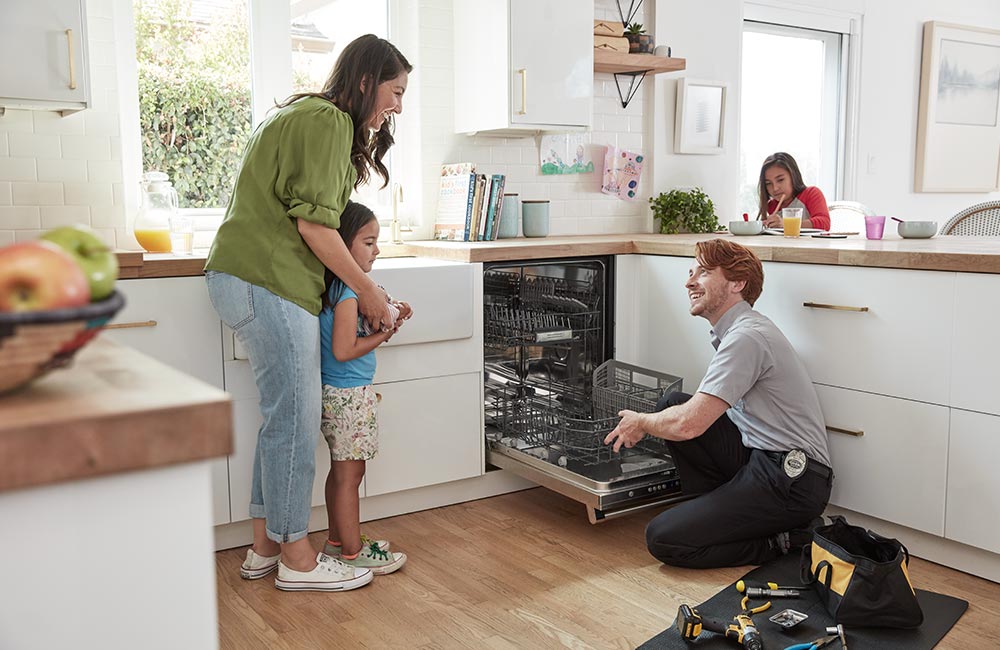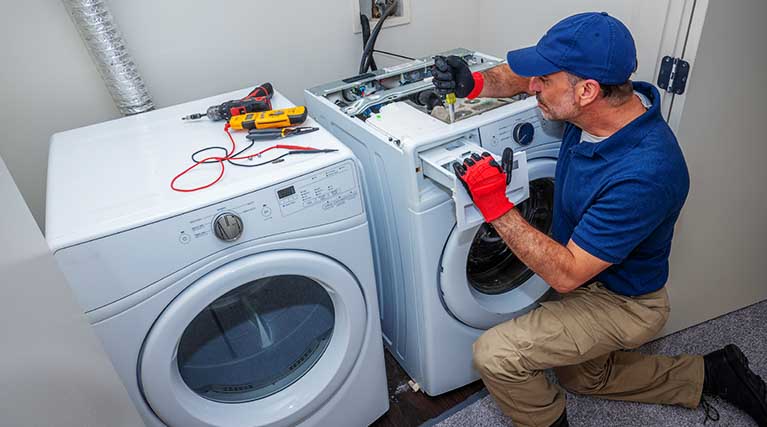Washing Machine Not Spinning? – Fixes washers and dryers Oro valley Dependable Appliance Repair
The Ultimate Overview to Comprehending Device Repair Work at Home
When your refrigerator quits cooling down or your oven declines to heat, it can really feel overwhelming. Comprehending device repair in the house can conserve you money and time. You'll learn to acknowledge symptoms, make use of crucial tools, and follow a systematic troubleshooting procedure. Before you start, there are critical security preventative measures you need to take into account. What are one of the most usual troubles, and exactly how can you fix them? Let's explore the essentials.
Typical Device Troubles and Their Signs and symptoms
When your devices start acting up, it's necessary to acknowledge the indications early on. Disregarding them can result in larger issues and pricey repair work. If your fridge isn't cooling down correctly, you could discover cozy spots or condensation creating. This could indicate a falling short compressor or an obstructed vent.Your dish washer may show troubles with unclean meals or unusual noises during cycles. If you hear grinding or clanking, it's time to investigate.A washing machine that will not spin or drain pipes can leave you with soaked washing, suggesting a blocked drainpipe or a malfunctioning pump.Lastly, if your stove's temperature appears off or it takes permanently to pre-heat, you may be taking care of a faulty thermostat. By staying alert to these signs and symptoms, you can address problems prior to they escalate right into major repair work.
Important Devices for Appliance Repair Work
When you're taking on device repair work in the house, having the right devices is necessary. Standard hand devices like screwdrivers and pliers will aid you disassemble and fix numerous appliances, while electric testing tools assure you're functioning securely with circuitry. Let's discuss what you need to start on your repair service journey.
Basic Hand Devices
Having the right devices is important for effective device fixing in your home. Start with a reputable screwdriver collection, including both flathead and Phillips types, as screws are common in appliance setting up. Pliers are also essential; they aid with gripping, twisting, and reducing wires or small components. A set of needle-nose pliers can reach difficult situations quickly. You'll need a great adjustable wrench for tightening up or loosening up nuts and bolts. An energy knife comes in handy for puncturing product packaging or insulation. Ultimately, don't forget a tough workbench or surface to securely arrange your devices and parts. With these basic hand devices, you'll be well-prepared to tackle most home appliance fixings that come your method.
Electric Testing Instruments
Together with standard hand devices, electric screening devices play an important duty in appliance repair. These devices help you detect electrical problems and warranty appliances operate securely. A multimeter is important; it gauges voltage, existing, and resistance, allowing you to determine problems swiftly. A non-contact voltage tester is an additional must-have, allowing you detect live cords without making direct get in touch with, improving your safety and security. Secure meters are terrific for gauging present flow in cables without detaching them, conserving you effort and time. In addition, circuit testers can promptly check if electrical outlets are operating properly. By using these gadgets, you'll improve your troubleshooting process and boost your fixing skills, making home appliance maintenance a lot less complicated.
Step-by-Step Guide to Diagnosing Home Appliance Issues
When your home appliance breaks down, it can be frustrating, yet detecting the problem doesn't need to be overwhelming. You'll learn to identify typical troubles and use reliable fixing methods. Let's walk via the actions to obtain your appliance back in functioning order.
Usual Device Troubles

Troubleshooting Methods Described

Repairing Significant Kitchen Area Home Appliances: A Closer Look
Have you ever before wondered just how to tackle typical issues with your kitchen area appliances? Repairing major kitchen devices like refrigerators, ovens, and dish washers can be easier than you believe. Begin by recognizing the issue-- whether it's a fridge not cooling down or a stove that won't heat up. Often, an easy reset or inspecting the power source can resolve the issue.For fridges, clean the condenser coils and inspect the door seals. If your stove's not heating, evaluate the home heating component and thermostat. Dishwashers may simply need a tidy filter or a reset to obtain them back at work. Constantly disconnect the appliance before diving right into fixings to guarantee your safety.Don' t forget to get in touch with the user guidebook for specific troubleshooting ideas associated to your version. With a little patience and the right tools, you can with confidence deal with device repair work and save money in the procedure!

Repairing Laundry Equipments: Tips and Techniques
When your washing devices begin acting up, it can feel overwhelming, however troubleshooting them doesn't have to be a trouble. Beginning by checking the power supply. Validate the home appliance is connected in and the electrical outlet is functioning. Next, examine the door or cover button; a defective switch can protect against the machine from operating.For washers, if it's not spinning, look for out of balance loads. Redistributing the clothes might address the issue. If your dryer isn't home heating, tidy the dust filter and inspect the vent for blockages.Listen for unusual sounds; they can suggest a problem. If your appliance is leaking, check the tubes for splits or loosened links. Record any kind of mistake codes shown on digital displays, as they can assist you in recognizing the concern. Consult the user guidebook for particular troubleshooting tips connected to your version.
Security Precautions to Take Throughout Repair works
Before you start any type of device repair services, it's necessary to prioritize safety to avoid mishaps or injuries. First, disconnect the appliance or switch off the breaker to ensure no power reaches it while you work. Usage protected tools to reduce the danger of electric shock. Put on security goggles and handwear covers to safeguard yourself from sharp sides or debris (Dependable Refrigeration & Appliance Repair Service Washer repair near me).Make certain your work space is neat and well-lit, so you can see what you're doing. Maintain children and family pets click here far from the location to avoid disturbances and potential hazards. If you're taking care of gas devices, be extra mindful; check for leakages prior to proceeding.Take your time, and don't hurry with repair services. If you really feel uncertain about any step, it's much better to stop and research study than to presume. Complying with these preventative measures will assist produce a more secure environment for your DIY appliance repair job
When to Call a Specialist for Help
How do you recognize if it's time to employ an expert for device fixings? If you have actually attempted basic troubleshooting without success, it's a clear indication. If your appliance still won't start or reveals uncommon sounds after resetting it, don't be reluctant to look for specialist help.When you see leaks, smoke, or shedding scents, prioritize safety and security and call a pro right away. These issues can bring about even more substantial damage or pose threats to your home.Also, if your home appliance is under guarantee, calling a professional is often the most effective route. They can assure that fixings will not nullify your warranty, conserving you cash in the long run.Finally, if you're unsure or awkward with complicated repairs, it's wise to leave it to the experts. Keep in mind, tackling complicated concerns without the ideal competence can lead to expensive mistakes. Count on an expert when unsure!
Frequently Asked Questions
Exactly How Can I Protect Against Appliance Issues in the Future?
To avoid home appliance problems in the future, you ought to do routine maintenance, check for deterioration, clean filters, and prevent overloading. Remaining proactive will certainly assist extend their life-span and keep them running efficiently.
What Are the A Lot Of Typical Do It Yourself Appliance Fixing Mistakes?
You may overlook security preventative measures, skip fixing steps, or utilize inaccurate tools when trying do it yourself appliance repairs. Rushing the procedure or ignoring producer guidelines can cause even more considerable concerns and expensive errors. Keep client and notified!
Exactly how Do I Know if a Component Needs Replacement?
You can tell if a part needs replacement by looking for unusual noises, leakages, or inconsistent performance. If the home appliance struggles to operate appropriately or shows noticeable damages, it's most likely time for a replacement.
Can I Use Generic Components for Device Services?
Yes, you can utilize generic parts for appliance repair services, but ascertain they work - Dependable Refrigeration & Appliance Repair Service Washing Machine Repair. Generic parts may save you cash, however they might impact performance or long life, so evaluate your choices meticulously before choosing
What Service Warranties Cover Home Appliance Repairs?
Most home appliance warranties cover fixings for making problems, yet they commonly omit damage from abuse. Examine your service warranty terms thoroughly, as some could need utilizing licensed technicians and original components for coverage to stay legitimate.